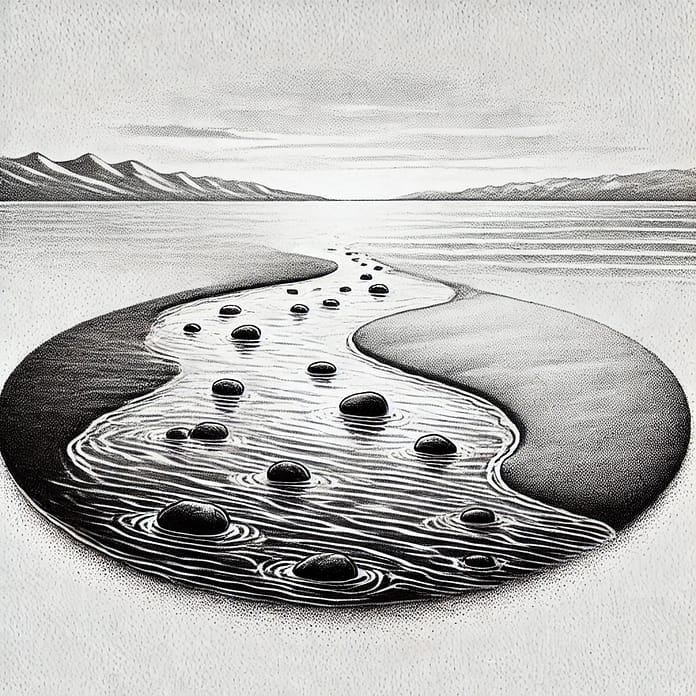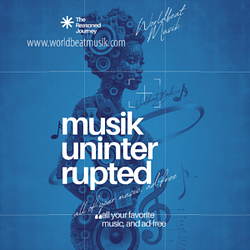There is a quiet truth in the way the river flows. It is not the same river you stepped into yesterday, yet it remembers. Each stone in its bed has shaped its journey—deflecting, guiding, resisting. The river carries these stones as scars, lessons, and identity. It flows not despite them but because of them. The ocean, vast and infinite, knows another truth. It takes all the river offers and dissolves it into anonymity. The ocean does not grieve the loss of a single drop; it cannot. It is too large, too timeless. Together, the river and the ocean ask a question of us: what should we hold, and what must we let go?
To understand this, you must first see yourself in the river. Memory anchors your identity, connecting who you were to who you are becoming. Psychologists call this autobiographical memory—the record of your life’s most meaningful events. It is the story you tell yourself about yourself. Each moment, like a stone, is lodged in the riverbed of your mind. You return to these stones because they are familiar, even when they are sharp. A joyful memory of childhood becomes a smooth stone you carry lightly. A painful one—a betrayal, a loss, a failure—may sit heavier, altering your course. Why do we hold on to the memories that hurt us most? The answer lies in their weight. Pain commands attention. It teaches, warns, and shapes. But it also anchors, and sometimes it anchors too deeply.
The human mind clings to pain because it fears forgetting. This is a survival instinct. Forgetfulness feels like vulnerability—a loss of the lessons learned. Yet the ocean, vast and unburdened, whispers a counterpoint. Forgetting is not a failure. It is freedom. To let go of pain is not to erase it but to dissolve it, to release its hold on your present. Memory is a tool, not a prison. Without the capacity to forget, you would be overwhelmed by the sheer volume of your life. The ocean knows this. It accepts the river’s offerings and scatters them, making space for what comes next.

In the tension between the river and the ocean, there is a balance we must seek. The river teaches the necessity of remembrance. Every stone is a reminder: this happened, and it mattered. But the ocean teaches the necessity of release. Not everything must remain sharp and distinct. Time softens what it can, and what it cannot, we must choose to let go.
Psychologists speak of this balance in terms of emotional regulation and resilience. Painful memories often linger because they carry unresolved emotions—grief left unexpressed, anger unacknowledged. Techniques like mindfulness and cognitive-behavioral therapy teach us how to face these stones without allowing them to dominate our flow. Mindfulness encourages you to observe your thoughts as they arise, acknowledging them without clinging. A memory of loss becomes a wave, rising and falling, rather than a stone fixed in place. Cognitive-behavioral techniques challenge the distortions we attach to our memories—unpacking the belief that one failure defines us or that one betrayal means we are unworthy of trust.
Why do some memories fade while others persist? The answer lies in emotional salience. Events that provoke strong feelings—whether joy or pain—are encoded more deeply in the brain. Yet even these can soften over time, provided we do not rehearse their pain. Replaying a hurtful memory strengthens its hold, like a stone pressed deeper into the riverbed. Healing, then, requires the opposite: an oceanic perspective that allows these stones to be carried away, not as erasure but as transformation.
The ocean does not ask you to forget completely. It asks you to let go of the weight, to see the drop not as lost but as part of something larger. Trauma, grief, and regret are not meant to define you forever. They are markers on the map, not the map itself. When you allow the ocean to carry these drops, you do not lose their lessons. You lose only the sharpness that keeps you stuck.

What would it mean for you to let go? To release the memory of a mistake, knowing it no longer serves you? To forgive someone—not to excuse them, but to free yourself from the stone of resentment? To forgive yourself? These acts are not weakness. They are strength. They are the choice to flow forward rather than remain trapped in a bend of the river.
The ocean’s forgetting is also a lesson in humility. Your life is singular, but it is not solitary. Each drop you release joins the vastness of humanity’s collective experience. Psychologists call this sense of connection the collective unconscious—the shared reservoir of symbols, struggles, and wisdom that binds us. Your pain is unique, but it is also universal. To let go is to recognize that your story is part of something greater, and in that recognition, you find freedom.
The river and the ocean are not adversaries. They are partners in the journey, each offering a gift. The river gives you memory, identity, and the lessons of the stones. The ocean gives you release, perspective, and the promise of renewal. Together, they remind you that life is both personal and infinite. You are both the keeper of stones and the dissolver of drops.
As you stand at the edge of your river, looking toward the ocean, ask yourself: what am I carrying that I no longer need? What weight can I release into the waters? The answers may not come all at once, but the act of asking is itself a step forward. Remember what must be remembered. Let go of what must be released. Flow forward. The river and the ocean await.
Discover more from The Reasoned Journey
Subscribe to get the latest posts sent to your email.


